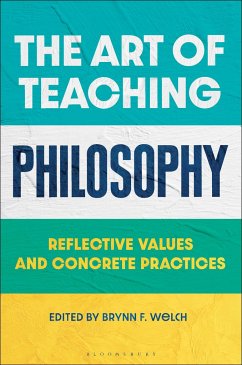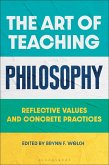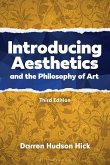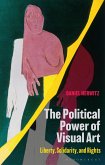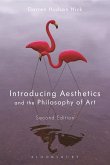The Art of Teaching Philosophy
Reflective Values and Concrete Practices
Herausgeber: Welch, Brynn F.
The Art of Teaching Philosophy
Reflective Values and Concrete Practices
Herausgeber: Welch, Brynn F.
- Broschiertes Buch
- Merkliste
- Auf die Merkliste
- Bewerten Bewerten
- Teilen
- Produkt teilen
- Produkterinnerung
- Produkterinnerung
"From a team of renowned and innovative philosophy teachers, this volume offers accessible reflections and practical suggestions for constructing a successful philosophy course. The collection covers syllabus design, classroom management, and exercises and assessments, with each section concluding with insights from students on what they have learned from studying philosophy. An essential resource for teachers of philosophy at any stage of their career, each contribution balances reflective values with concrete practices and presents a valuable discussion about theories of philosophy pedagogy"--…mehr
Andere Kunden interessierten sich auch für
![The Art of Teaching Philosophy The Art of Teaching Philosophy]() The Art of Teaching Philosophy82,99 €
The Art of Teaching Philosophy82,99 €![Introducing Aesthetics and the Philosophy of Art Introducing Aesthetics and the Philosophy of Art]() Professor Darren Hudson HickIntroducing Aesthetics and the Philosophy of Art33,99 €
Professor Darren Hudson HickIntroducing Aesthetics and the Philosophy of Art33,99 €![The Political Power of Visual Art The Political Power of Visual Art]() Daniel Herwitz (USA University of Michigan)The Political Power of Visual Art33,99 €
Daniel Herwitz (USA University of Michigan)The Political Power of Visual Art33,99 €![Philosophy of the Family Philosophy of the Family]() Teresa Baron (Prague Czech Academy of Sciences)Philosophy of the Family94,99 €
Teresa Baron (Prague Czech Academy of Sciences)Philosophy of the Family94,99 €![The Art of Living The Art of Living]() Dr John SellarsThe Art of Living35,99 €
Dr John SellarsThe Art of Living35,99 €![Introducing Aesthetics and the Philosophy of Art Introducing Aesthetics and the Philosophy of Art]() Professor Darren Hudson Hick (USA Furman University)Introducing Aesthetics and the Philosophy of Art40,99 €
Professor Darren Hudson Hick (USA Furman University)Introducing Aesthetics and the Philosophy of Art40,99 €![Buddhist Ethics and the Bodhisattva Path Buddhist Ethics and the Bodhisattva Path]() Stephen HarrisBuddhist Ethics and the Bodhisattva Path29,99 €
Stephen HarrisBuddhist Ethics and the Bodhisattva Path29,99 €-
-
-
"From a team of renowned and innovative philosophy teachers, this volume offers accessible reflections and practical suggestions for constructing a successful philosophy course. The collection covers syllabus design, classroom management, and exercises and assessments, with each section concluding with insights from students on what they have learned from studying philosophy. An essential resource for teachers of philosophy at any stage of their career, each contribution balances reflective values with concrete practices and presents a valuable discussion about theories of philosophy pedagogy"--
Hinweis: Dieser Artikel kann nur an eine deutsche Lieferadresse ausgeliefert werden.
Hinweis: Dieser Artikel kann nur an eine deutsche Lieferadresse ausgeliefert werden.
Produktdetails
- Produktdetails
- Verlag: Bloomsbury Publishing PLC
- Seitenzahl: 368
- Erscheinungstermin: 22. August 2024
- Englisch
- Abmessung: 233mm x 155mm x 29mm
- Gewicht: 566g
- ISBN-13: 9781350404816
- ISBN-10: 1350404810
- Artikelnr.: 69079191
- Herstellerkennzeichnung
- Libri GmbH
- Europaallee 1
- 36244 Bad Hersfeld
- gpsr@libri.de
- Verlag: Bloomsbury Publishing PLC
- Seitenzahl: 368
- Erscheinungstermin: 22. August 2024
- Englisch
- Abmessung: 233mm x 155mm x 29mm
- Gewicht: 566g
- ISBN-13: 9781350404816
- ISBN-10: 1350404810
- Artikelnr.: 69079191
- Herstellerkennzeichnung
- Libri GmbH
- Europaallee 1
- 36244 Bad Hersfeld
- gpsr@libri.de
Brynn Welch is Associate Professor of Philosophy at the University of Alabama at Birmingham, USA. She received the Excellence in Teaching Award from Emory & Henry in 2016, the Dean's Award for Excellence in Teaching at UAB in 2021, and the UAB Disability Support Services Outstanding Faculty Award in 2022.
Introduction
Brynn F. Welch Part I. The Philosophy Course 1. De-Centering the Professor (Not by Design)
Karen Adkins (Regis University
USA) 2. Freedom Anchoring: Teaching Philosophy as a Dialogic Endeavor
Corey Reed (Butler University
USA) 3. Syllabus Design and World-Making
Rima Basu (Claremont McKenna College
USA) 4. Deadlines
Learner-Centeredness
and Non Ideal Pedagogy
Christopher Blake-Turner (Oklahoma State University
USA) 5. Philosophy Through Spectacle
Meg Wallace (University of Kentucky
USA) 6. Ethics for Everyday Life: Designing a Core Philosophy Class
K. Lindsey Chambers (University of Kentucky
USA) 7. Less is More: How and Why to Avoid a Content-Driven Course
Heather Anne Phillips (Georgia State University
USA) 8. The (Un)Political Classroom: How Content and Positionality Intersect to Encourage Students to be Agents of Change
John R. Torrey (SUNY Buffalo State
USA) 9. A Student's Reflections
Zyaire Hadrian Agee (University of Alabama at Birmingham
USA) Part II. The Philosophy Classroom 10. Save the 1001 Cats! Lecture as a Performance Art
Jimmy Goodrich (University of Wisconsin
USA) 11. Flatten that Hierarchy: Everyone Wins When We All Teach (and Learn) Together
W. John Koolage (Eastern Michigan University
USA) 12. Trust in the Classroom
Barrett Emerick (St. Mary's College of Maryland
USA) 13. What to Do When Students Don't Do Course Readings
Alida Liberman (Southern Methodist University
USA) 14. When Conversation Goes Wrong: Managing Student Errors
Russell Marcus and Alessandro Moscarítolo Palacio (Hamilton College
USA) 15. Gender Dynamics in the Philosophy Classroom
Harry Brighouse (University of Wisconsin
USA) 16. Cultivating Playfulness for Unlearning in the Philosophy Classroom
Rebecca Scott (Harper College
USA) 17. When Crito and Plato Came to Class: Gameful Learning in the Philosophy Classroom
Greta LaFore (Gonzaga University
USA) 18. Not Just for the Kids: Using Children's Literature and P4C Methods in the College Classroom
Karen S. Emmerman (University of Washington
USA) 19. Participation as Gratitude Practice
Stephen Bloch-Schulman (Elon University
USA) 20. In Conclusion
I Don't Know: Humility as the Beginning and End of Every Class
Brynn F. Welch (University of Alabama at Birmingham) 21. A Student's Reflections
Anna Ulrey (UAB Heersink School of Medicine
USA) Part III. Exercises and Assessments 22. A Primer for Discussing Dispositional Growth
David W. Concepción (Ball State University
USA) 23. Dialogue
Virtue
and Assessment: Teaching for More than Technical Proficiency
Kristopher G. Phillips (Eastern Michigan University
USA) 24. Student Transformation through Civic Engagement Projects
Monica "Mo" Janzen and Ramona Ilea (Anoka-Ramsey Community College and Pacific University Oregon
USA) 25. Discussion
Self-Assessment
and the Discussion Moves Framework
Christopher Blake-Turner (Oklahoma State University
USA) 26. Argument Diagramming as a Teaching Tool for Philosophy
Maralee Harrell (University of California
San Diego
USA). 27. A Jigsaw Lesson for Symbolic Logic
Russell Marcus (Hamilton College
USA) 28. Teaching with Puzzles
David O'Brien (Tulane University
USA) 29. Students Make Pudding
Stephen Bloch-Schulman (Elon University
USA) 30. Prisoner's Dilemma and Delight: A Simple Activity that Helps Students Understand the Complexity of Others
Joshua DiPaolo (California State University
Fullerton
USA) 31. Will the Gendered Division of Labor Be An Issue in Your Generation? An Exercise
Harry Brighouse (University of Wisconsin
USA) 32. Feminist Critiques of the Original Position
Susan Kennedy (Santa Clara University
USA) 33. The Clear and Concise AF Assignment
Dustin Locke (Claremont McKenna College
USA) 34. Emile and Sophie on Tinder: Using Social Media as an Assessment for Philosophy
Claire Katz (Texas A&M University
USA) 35. On Writing Fun
Joyful
Open-Ended Exams
C. Thi Nguyen (University of Utah
USA) 36. It's Not "Stephen's Final" Project
Stephen Bloch-Schulman (Elon University
USA) 37. A Student's Reflections
Micah Williams (University of Rochester
USA) Part IV. What Comes Next 38. The Why and How of Mentoring in Undergraduate Philosophy Teaching
Emma Prendergast (Utah Tech University
USA) 39. Making Teaching Count
Britta Clark and Gina Schouten (Harvard University
USA) Index
Brynn F. Welch Part I. The Philosophy Course 1. De-Centering the Professor (Not by Design)
Karen Adkins (Regis University
USA) 2. Freedom Anchoring: Teaching Philosophy as a Dialogic Endeavor
Corey Reed (Butler University
USA) 3. Syllabus Design and World-Making
Rima Basu (Claremont McKenna College
USA) 4. Deadlines
Learner-Centeredness
and Non Ideal Pedagogy
Christopher Blake-Turner (Oklahoma State University
USA) 5. Philosophy Through Spectacle
Meg Wallace (University of Kentucky
USA) 6. Ethics for Everyday Life: Designing a Core Philosophy Class
K. Lindsey Chambers (University of Kentucky
USA) 7. Less is More: How and Why to Avoid a Content-Driven Course
Heather Anne Phillips (Georgia State University
USA) 8. The (Un)Political Classroom: How Content and Positionality Intersect to Encourage Students to be Agents of Change
John R. Torrey (SUNY Buffalo State
USA) 9. A Student's Reflections
Zyaire Hadrian Agee (University of Alabama at Birmingham
USA) Part II. The Philosophy Classroom 10. Save the 1001 Cats! Lecture as a Performance Art
Jimmy Goodrich (University of Wisconsin
USA) 11. Flatten that Hierarchy: Everyone Wins When We All Teach (and Learn) Together
W. John Koolage (Eastern Michigan University
USA) 12. Trust in the Classroom
Barrett Emerick (St. Mary's College of Maryland
USA) 13. What to Do When Students Don't Do Course Readings
Alida Liberman (Southern Methodist University
USA) 14. When Conversation Goes Wrong: Managing Student Errors
Russell Marcus and Alessandro Moscarítolo Palacio (Hamilton College
USA) 15. Gender Dynamics in the Philosophy Classroom
Harry Brighouse (University of Wisconsin
USA) 16. Cultivating Playfulness for Unlearning in the Philosophy Classroom
Rebecca Scott (Harper College
USA) 17. When Crito and Plato Came to Class: Gameful Learning in the Philosophy Classroom
Greta LaFore (Gonzaga University
USA) 18. Not Just for the Kids: Using Children's Literature and P4C Methods in the College Classroom
Karen S. Emmerman (University of Washington
USA) 19. Participation as Gratitude Practice
Stephen Bloch-Schulman (Elon University
USA) 20. In Conclusion
I Don't Know: Humility as the Beginning and End of Every Class
Brynn F. Welch (University of Alabama at Birmingham) 21. A Student's Reflections
Anna Ulrey (UAB Heersink School of Medicine
USA) Part III. Exercises and Assessments 22. A Primer for Discussing Dispositional Growth
David W. Concepción (Ball State University
USA) 23. Dialogue
Virtue
and Assessment: Teaching for More than Technical Proficiency
Kristopher G. Phillips (Eastern Michigan University
USA) 24. Student Transformation through Civic Engagement Projects
Monica "Mo" Janzen and Ramona Ilea (Anoka-Ramsey Community College and Pacific University Oregon
USA) 25. Discussion
Self-Assessment
and the Discussion Moves Framework
Christopher Blake-Turner (Oklahoma State University
USA) 26. Argument Diagramming as a Teaching Tool for Philosophy
Maralee Harrell (University of California
San Diego
USA). 27. A Jigsaw Lesson for Symbolic Logic
Russell Marcus (Hamilton College
USA) 28. Teaching with Puzzles
David O'Brien (Tulane University
USA) 29. Students Make Pudding
Stephen Bloch-Schulman (Elon University
USA) 30. Prisoner's Dilemma and Delight: A Simple Activity that Helps Students Understand the Complexity of Others
Joshua DiPaolo (California State University
Fullerton
USA) 31. Will the Gendered Division of Labor Be An Issue in Your Generation? An Exercise
Harry Brighouse (University of Wisconsin
USA) 32. Feminist Critiques of the Original Position
Susan Kennedy (Santa Clara University
USA) 33. The Clear and Concise AF Assignment
Dustin Locke (Claremont McKenna College
USA) 34. Emile and Sophie on Tinder: Using Social Media as an Assessment for Philosophy
Claire Katz (Texas A&M University
USA) 35. On Writing Fun
Joyful
Open-Ended Exams
C. Thi Nguyen (University of Utah
USA) 36. It's Not "Stephen's Final" Project
Stephen Bloch-Schulman (Elon University
USA) 37. A Student's Reflections
Micah Williams (University of Rochester
USA) Part IV. What Comes Next 38. The Why and How of Mentoring in Undergraduate Philosophy Teaching
Emma Prendergast (Utah Tech University
USA) 39. Making Teaching Count
Britta Clark and Gina Schouten (Harvard University
USA) Index
Introduction
Brynn F. Welch Part I. The Philosophy Course 1. De-Centering the Professor (Not by Design)
Karen Adkins (Regis University
USA) 2. Freedom Anchoring: Teaching Philosophy as a Dialogic Endeavor
Corey Reed (Butler University
USA) 3. Syllabus Design and World-Making
Rima Basu (Claremont McKenna College
USA) 4. Deadlines
Learner-Centeredness
and Non Ideal Pedagogy
Christopher Blake-Turner (Oklahoma State University
USA) 5. Philosophy Through Spectacle
Meg Wallace (University of Kentucky
USA) 6. Ethics for Everyday Life: Designing a Core Philosophy Class
K. Lindsey Chambers (University of Kentucky
USA) 7. Less is More: How and Why to Avoid a Content-Driven Course
Heather Anne Phillips (Georgia State University
USA) 8. The (Un)Political Classroom: How Content and Positionality Intersect to Encourage Students to be Agents of Change
John R. Torrey (SUNY Buffalo State
USA) 9. A Student's Reflections
Zyaire Hadrian Agee (University of Alabama at Birmingham
USA) Part II. The Philosophy Classroom 10. Save the 1001 Cats! Lecture as a Performance Art
Jimmy Goodrich (University of Wisconsin
USA) 11. Flatten that Hierarchy: Everyone Wins When We All Teach (and Learn) Together
W. John Koolage (Eastern Michigan University
USA) 12. Trust in the Classroom
Barrett Emerick (St. Mary's College of Maryland
USA) 13. What to Do When Students Don't Do Course Readings
Alida Liberman (Southern Methodist University
USA) 14. When Conversation Goes Wrong: Managing Student Errors
Russell Marcus and Alessandro Moscarítolo Palacio (Hamilton College
USA) 15. Gender Dynamics in the Philosophy Classroom
Harry Brighouse (University of Wisconsin
USA) 16. Cultivating Playfulness for Unlearning in the Philosophy Classroom
Rebecca Scott (Harper College
USA) 17. When Crito and Plato Came to Class: Gameful Learning in the Philosophy Classroom
Greta LaFore (Gonzaga University
USA) 18. Not Just for the Kids: Using Children's Literature and P4C Methods in the College Classroom
Karen S. Emmerman (University of Washington
USA) 19. Participation as Gratitude Practice
Stephen Bloch-Schulman (Elon University
USA) 20. In Conclusion
I Don't Know: Humility as the Beginning and End of Every Class
Brynn F. Welch (University of Alabama at Birmingham) 21. A Student's Reflections
Anna Ulrey (UAB Heersink School of Medicine
USA) Part III. Exercises and Assessments 22. A Primer for Discussing Dispositional Growth
David W. Concepción (Ball State University
USA) 23. Dialogue
Virtue
and Assessment: Teaching for More than Technical Proficiency
Kristopher G. Phillips (Eastern Michigan University
USA) 24. Student Transformation through Civic Engagement Projects
Monica "Mo" Janzen and Ramona Ilea (Anoka-Ramsey Community College and Pacific University Oregon
USA) 25. Discussion
Self-Assessment
and the Discussion Moves Framework
Christopher Blake-Turner (Oklahoma State University
USA) 26. Argument Diagramming as a Teaching Tool for Philosophy
Maralee Harrell (University of California
San Diego
USA). 27. A Jigsaw Lesson for Symbolic Logic
Russell Marcus (Hamilton College
USA) 28. Teaching with Puzzles
David O'Brien (Tulane University
USA) 29. Students Make Pudding
Stephen Bloch-Schulman (Elon University
USA) 30. Prisoner's Dilemma and Delight: A Simple Activity that Helps Students Understand the Complexity of Others
Joshua DiPaolo (California State University
Fullerton
USA) 31. Will the Gendered Division of Labor Be An Issue in Your Generation? An Exercise
Harry Brighouse (University of Wisconsin
USA) 32. Feminist Critiques of the Original Position
Susan Kennedy (Santa Clara University
USA) 33. The Clear and Concise AF Assignment
Dustin Locke (Claremont McKenna College
USA) 34. Emile and Sophie on Tinder: Using Social Media as an Assessment for Philosophy
Claire Katz (Texas A&M University
USA) 35. On Writing Fun
Joyful
Open-Ended Exams
C. Thi Nguyen (University of Utah
USA) 36. It's Not "Stephen's Final" Project
Stephen Bloch-Schulman (Elon University
USA) 37. A Student's Reflections
Micah Williams (University of Rochester
USA) Part IV. What Comes Next 38. The Why and How of Mentoring in Undergraduate Philosophy Teaching
Emma Prendergast (Utah Tech University
USA) 39. Making Teaching Count
Britta Clark and Gina Schouten (Harvard University
USA) Index
Brynn F. Welch Part I. The Philosophy Course 1. De-Centering the Professor (Not by Design)
Karen Adkins (Regis University
USA) 2. Freedom Anchoring: Teaching Philosophy as a Dialogic Endeavor
Corey Reed (Butler University
USA) 3. Syllabus Design and World-Making
Rima Basu (Claremont McKenna College
USA) 4. Deadlines
Learner-Centeredness
and Non Ideal Pedagogy
Christopher Blake-Turner (Oklahoma State University
USA) 5. Philosophy Through Spectacle
Meg Wallace (University of Kentucky
USA) 6. Ethics for Everyday Life: Designing a Core Philosophy Class
K. Lindsey Chambers (University of Kentucky
USA) 7. Less is More: How and Why to Avoid a Content-Driven Course
Heather Anne Phillips (Georgia State University
USA) 8. The (Un)Political Classroom: How Content and Positionality Intersect to Encourage Students to be Agents of Change
John R. Torrey (SUNY Buffalo State
USA) 9. A Student's Reflections
Zyaire Hadrian Agee (University of Alabama at Birmingham
USA) Part II. The Philosophy Classroom 10. Save the 1001 Cats! Lecture as a Performance Art
Jimmy Goodrich (University of Wisconsin
USA) 11. Flatten that Hierarchy: Everyone Wins When We All Teach (and Learn) Together
W. John Koolage (Eastern Michigan University
USA) 12. Trust in the Classroom
Barrett Emerick (St. Mary's College of Maryland
USA) 13. What to Do When Students Don't Do Course Readings
Alida Liberman (Southern Methodist University
USA) 14. When Conversation Goes Wrong: Managing Student Errors
Russell Marcus and Alessandro Moscarítolo Palacio (Hamilton College
USA) 15. Gender Dynamics in the Philosophy Classroom
Harry Brighouse (University of Wisconsin
USA) 16. Cultivating Playfulness for Unlearning in the Philosophy Classroom
Rebecca Scott (Harper College
USA) 17. When Crito and Plato Came to Class: Gameful Learning in the Philosophy Classroom
Greta LaFore (Gonzaga University
USA) 18. Not Just for the Kids: Using Children's Literature and P4C Methods in the College Classroom
Karen S. Emmerman (University of Washington
USA) 19. Participation as Gratitude Practice
Stephen Bloch-Schulman (Elon University
USA) 20. In Conclusion
I Don't Know: Humility as the Beginning and End of Every Class
Brynn F. Welch (University of Alabama at Birmingham) 21. A Student's Reflections
Anna Ulrey (UAB Heersink School of Medicine
USA) Part III. Exercises and Assessments 22. A Primer for Discussing Dispositional Growth
David W. Concepción (Ball State University
USA) 23. Dialogue
Virtue
and Assessment: Teaching for More than Technical Proficiency
Kristopher G. Phillips (Eastern Michigan University
USA) 24. Student Transformation through Civic Engagement Projects
Monica "Mo" Janzen and Ramona Ilea (Anoka-Ramsey Community College and Pacific University Oregon
USA) 25. Discussion
Self-Assessment
and the Discussion Moves Framework
Christopher Blake-Turner (Oklahoma State University
USA) 26. Argument Diagramming as a Teaching Tool for Philosophy
Maralee Harrell (University of California
San Diego
USA). 27. A Jigsaw Lesson for Symbolic Logic
Russell Marcus (Hamilton College
USA) 28. Teaching with Puzzles
David O'Brien (Tulane University
USA) 29. Students Make Pudding
Stephen Bloch-Schulman (Elon University
USA) 30. Prisoner's Dilemma and Delight: A Simple Activity that Helps Students Understand the Complexity of Others
Joshua DiPaolo (California State University
Fullerton
USA) 31. Will the Gendered Division of Labor Be An Issue in Your Generation? An Exercise
Harry Brighouse (University of Wisconsin
USA) 32. Feminist Critiques of the Original Position
Susan Kennedy (Santa Clara University
USA) 33. The Clear and Concise AF Assignment
Dustin Locke (Claremont McKenna College
USA) 34. Emile and Sophie on Tinder: Using Social Media as an Assessment for Philosophy
Claire Katz (Texas A&M University
USA) 35. On Writing Fun
Joyful
Open-Ended Exams
C. Thi Nguyen (University of Utah
USA) 36. It's Not "Stephen's Final" Project
Stephen Bloch-Schulman (Elon University
USA) 37. A Student's Reflections
Micah Williams (University of Rochester
USA) Part IV. What Comes Next 38. The Why and How of Mentoring in Undergraduate Philosophy Teaching
Emma Prendergast (Utah Tech University
USA) 39. Making Teaching Count
Britta Clark and Gina Schouten (Harvard University
USA) Index

